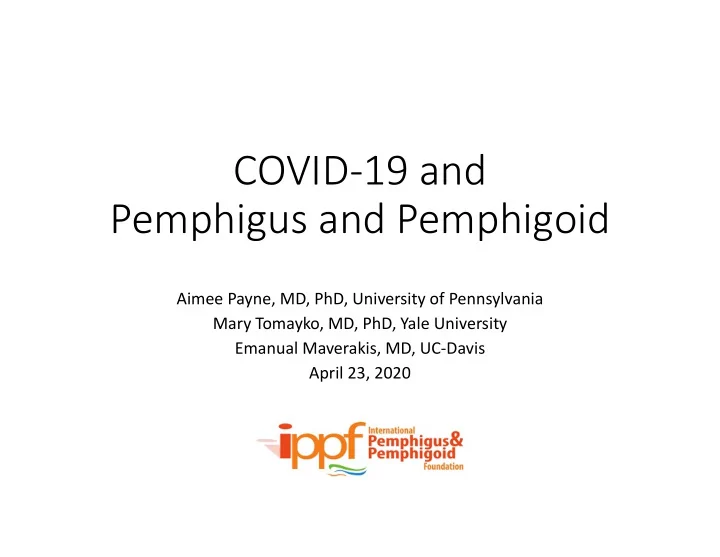

COVID-19 and Pemphigus and Pemphigoid Aimee Payne, MD, PhD, University of Pennsylvania Mary Tomayko, MD, PhD, Yale University Emanual Maverakis, MD, UC-Davis April 23, 2020
Overview Speaker Topic Aimee Payne, MD, PhD Primer on terms How the virus spreads Risks for serious COVID-19 disease Emanual Mavarakis, MD Protecting yourself from infection now Protecting yourself as your community “opens up” Mary Tomayko, MD. PhD If you contract COVID-19 now Vaccines in the future Panel discussion Questions and answers
Terminology review Term Meaning Coronavirus A general term for the family of viruses that cause respiratory illness (SARS, MERS, SARS-CoV-2) SARS-CoV-2 The official name for the virus causing the global pandemic (severe acute respiratory syndrome coronavirus 2), also called “novel coronavirus” to distinguish from the SARS 2003 outbreak COVID-19 “coronavirus disease 2019” – the official name of the disease caused by SARS-Co-V2 https://www.cdc.gov/coronavirus/2019-ncov/faq.html#covid19-basics
How the novel coronavirus (SARS-CoV2) spreads. Review. • Person-to-person spread is the major transmission route • Respiratory droplets from sneezing, coughing, or talking (6 foot range) • Smaller aerosolized particles that remain in the air up to hours can also be possible, most often with medical procedures • Virus can be spread by asymptomatic carriers • Traces of virus can be found on solid surfaces such as doorknobs, elevator buttons, bathroom fixtures (toilet/faucet), office fixtures (phone/desk/keyboard) COVID-19 is a serious disease, but most people will recover eventually.
Risk factors for severe COVID-19 disease • Age > 60 years, male, • Black and Latin Americans • Morbid obesity, poverty • Underlying chronic medical conditions (ranked by risk) • Kidney disease on dialysis, neurologic disease, heart disease, diabetes, former smoker, liver disease, immunocompromised state, lung disease, current smoker, pregnancy • Poorly controlled disease • Pemphigus and pemphigoid in and of itself, is not known to increase the risk of serious COVID-19 disease https://www.cdc.gov/coronavirus/2019-ncov/faq.html#high-risk
Risk of severe COVID-19 disease increases with age Hospitalized patients Per 100,000 people Age (years) CDC MMWR 4-17-2020 https://www.cdc.gov/mmwr/volumes/69/wr/mm6915e3.htm?s_cid=mm6915e3_w
An effective immune response clears the infection, but a robust inflammatory response causes severe disease Strength of anti-viral immune reaction Strength of inflammatory response Mild Severe disease disease
Protecting yourself from infection • Social distancing • Hand washing with soap and water or hand sanitizer • Avoid touching face, nose, eyes and mouth • Disinfect surfaces that are touched (door knobs, switches, rails) • Wear face masks in public • There are no medications known to prevent infection • Do NOT take hydroxychloroquine (Plaquenil) unless prescribed by your doctor • Avoid supplements unless prescribed by your doctor
How should these protections change as community life “opens up”? Recommendations do not change Short term • Partial social distancing (1/3 of normal interactions) • Medicines to treat disease may be identified in clinical trials • Testing for COVID virus/RNA (active infection) • Contact tracing - individuals within 6 feet of infected person for ≥10 mins in the past 14 days • Testing for COVID antibodies/serologies (immunity after resolved infection) • Contact tracing Long term • Herd immunity • ≥50% of the population are immune after recovering from infection or being immunized • Vaccine
Medications for P/P may increase the risk for severe COVID-19 disease Medication Time to lose effect Affect on response to virus Rituximab 4-12 months Probably weakens response CellCept 3 months Probably weakens response Azathioprine 3 months Probably weakens response Methotrexate 3-4 weeks Probably weakens response Prednisone (especially >20mg daily) Days - weeks (do NOT stop Probably weakens response suddenly!) IVIg 4 weeks Minimal Dapsone, doxycycline, nicotinamide Days - weeks Minimal Xolair, Dupixent 4 weeks Minimal
What if I Develop COVID-19 Disease? • CALL your doctor if you have concerning symptoms • Fever, cough, shortness of breath, loss of smell, diarrhea, red eyes, tender bumps on your toes • If you are severely short of breath, call 911. • Do not stop your medications unless directed by your physician • The NIH recommends that individuals on prednisone for health conditions do NOT stop prednisone if they are diagnosed with COVID-19 https://covid19treatmentguidelines.nih.gov/introduction/
The experience of P/P individuals with COVID- 19 to date is limited • There are no published outcomes data yet. • Our personal experience so far is encouraging. • The IPPF community may consider participating in the effort to understand this important question.
Protection from infection in the future: after infection • Antibody / serological tests may help determine who has been infected and recovered • Individuals who have recovered from COVID-19 will probably be protected to new infection, at least for a while (months-a few years)
The presence of virus indicates current infection. Antibodies indicate ongoing or previous infection. Infected Sick Recovering Recovered Reinfection Antibody (serological) tests: Was there a previous infection? Amount Antibody ? ? Virus Viral (RNA) tests: Is there an active infection? Time after infection
Protection from infection in the future: vaccination • Vaccine development will take time (many months to years). • Vaccine safety testing will be critical. • Some P/P medications may make a vaccine less effective • CellCept, azathioprine • Rituximab – especially in the first 4 months after infusion
Thank you! Question and Answers
Recommend
More recommend